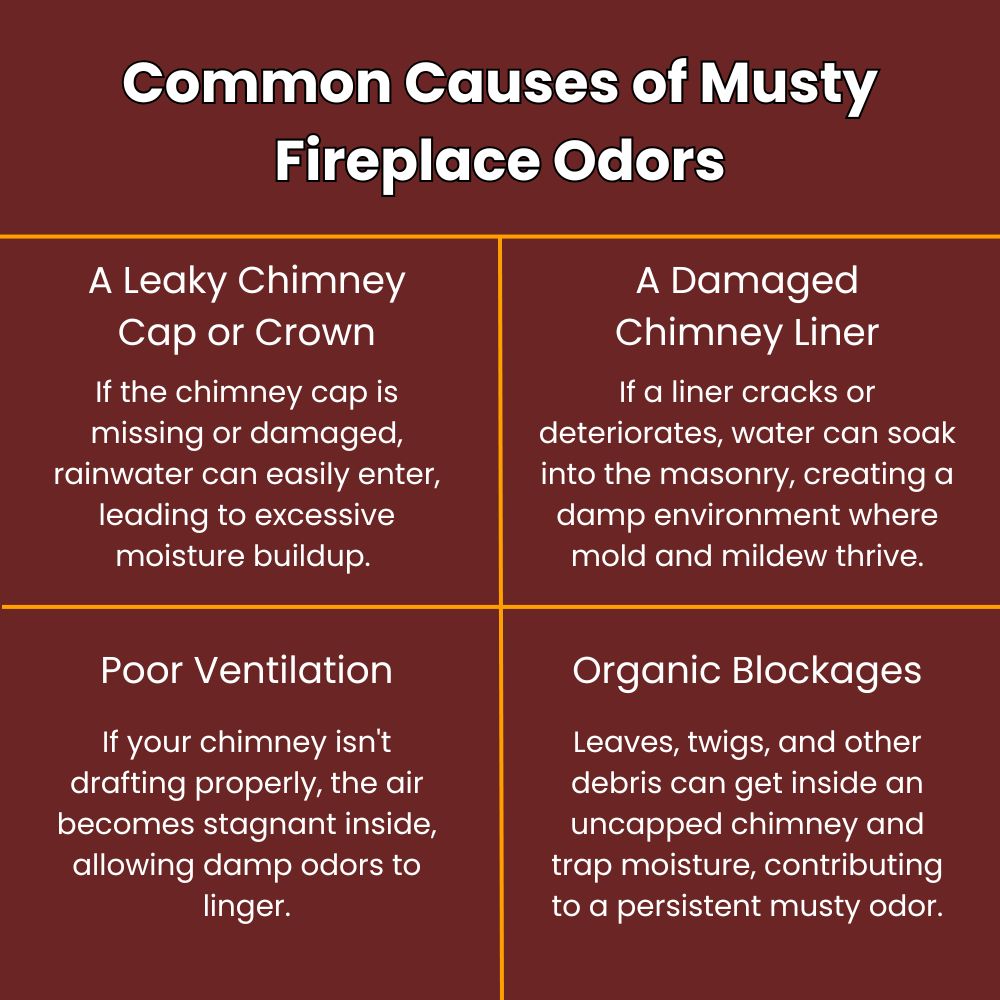A fireplace is meant to bring warmth and comfort to your home, but unpleasant odors from your chimney can quickly ruin the experience. If you’ve noticed musty, sulfur-like, or other strange smells, you’re not alone. Chimney odors are a common issue, especially in the warmer months when airflow slows down and humidity increases.
Odors can come and go depending on the weather, air pressure, and how often your fireplace is used. However, persistent smells are usually a sign of an underlying issue that needs attention. Whether it’s excess moisture, creosote buildup, or even animals in your chimney, identifying the cause is the first step to eliminating the smell for good.
If you’ve noticed a new odor coming from your fireplace or chimney, contact Top Cat Chimney Sweep and Service online or at 724-952-2761 to schedule a chimney inspection to find the root cause.
What Causes a Musty Smell in My Fireplace?
A musty or damp smell coming from your fireplace often signals a moisture problem inside the chimney. Since chimneys are exposed to the elements year-round, they are prone to water intrusion, which can lead to mold, mildew, and other moisture-related issues. Common causes of a musty odor include:
- Leaking chimney cap or crown. If the chimney cap is missing or damaged, rainwater can easily enter, leading to excessive moisture buildup. The chimney crown – which seals the top of the chimney – can also develop cracks over time, allowing water to seep in.

- Damaged or deteriorating chimney liner. A chimney liner protects the interior walls from moisture damage. If it cracks or deteriorates, water can soak into the masonry, creating a damp environment where mold and mildew thrive.
- Poor ventilation. If your chimney isn’t drafting properly, the air becomes stagnant inside, allowing damp odors to linger. Negative air pressure inside the home can also cause musty chimney smells to drift indoors.
- Organic blockages. Leaves, twigs, and other debris can get inside an uncapped chimney and trap moisture, contributing to a persistent musty odor. Over time, organic material that remains damp can start to decompose, making the smell even stronger.
Since mold and mildew can have health implications, it’s important to address musty chimney odors quickly. A professional chimney inspection by Top Cat Chimney can help pinpoint the cause and determine if waterproofing or repairs are needed to prevent further moisture problems.
What Does a Sulfur or Rotten Egg Smell From My Chimney Mean?
A sulfur or rotten egg smell coming from your chimney is a serious concern that requires immediate attention. If your home has a gas fireplace, this odor could be an early indicator of a gas leak. Natural gas is odorless on its own, but utility companies add a sulfur-like scent to help detect leaks. If you suspect a gas leak, leave the house immediately and contact your gas provider or emergency services. Do not attempt to use any appliances or light switches until the issue is resolved.
If you have a wood-burning fireplace and the smell is not related to a gas line, creosote buildup is the most likely cause. Creosote is a thick, tar-like substance that forms as a byproduct of burning wood. After a while, layers of creosote can accumulate along the chimney walls. When humidity interacts with creosote, it can produce a strong, acrid odor that some homeowners describe as similar to sulfur or asphalt. The more creosote buildup inside the chimney, the worse the smell becomes, especially in warm or damp weather.
A strong creosote odor is not only unpleasant but also a sign that your chimney needs to be cleaned. Excessive creosote increases the risk of chimney fires, making regular chimney maintenance a critical part of general household upkeep.
Could Animals in My Chimney Be Causing an Odor?
Animals nesting inside chimneys is a common problem, particularly for homes without a properly fitted chimney cap. Birds, squirrels, raccoons, and even bats often seek shelter inside chimneys, especially during colder months. Unfortunately, their presence can lead to strong and persistent odors.
When animals build nests inside a chimney, they use materials like leaves, which can start to decay over time and produce a foul smell. Animal droppings might also contribute to an unpleasant odor, especially if the chimney has poor ventilation. In some cases, animals become trapped inside and are unable to escape. If an animal dies inside the chimney, the resulting decomposition can produce an overwhelming stench that worsens each day until the remains are removed.
If you spot signs that an animal has taken up residence in your chimney, professional intervention is the safest option for you and the critter in question. A trained chimney sweep can assess the situation, advise you on removing existing animals or nesting materials, and install a chimney cap after removal to aid against future infestations.
Say Goodbye to Smelly Chimneys With Top Cat Chimney Sweep & Service
Fireplace odors can be frustrating, but they don’t have to be permanent. Whether the issue is moisture, creosote buildup, or an animal infestation, Top Cat Chimney Sweep and Service has the expertise to identify the problem and eliminate the smell at its source. Our team provides comprehensive chimney inspections, cleanings, and repairs to ensure your fireplace remains in working condition. Click here or call us at 724-952-2761 to schedule an appointment.
